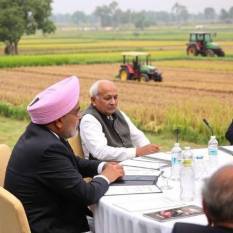CHANDIGARH, 26 June 2025: In a proactive move to ensure the smooth execution of paddy procurement for the upcoming 2025 Kharif season, the Punjab government has formed a subcommittee of ministers, chaired by Agriculture Minister Gurmeet Singh Khuddian.
The decision comes under the leadership of Chief Minister Bhagwant Singh Mann, as the state gears up to manage one of India’s largest grain procurement operations.
The Group of Ministers (GoM) held its first meeting today in Chandigarh, and includes Food, Civil Supplies & Consumer Affairs Minister Lal Chand Kataruchak, Transport Minister Laljit Singh Bhullar, and Water Resources Minister Barinder Kumar Goyal.
Speaking to the media, Minister Barinder Kumar Goyal highlighted the intent behind the initiative, saying: “Punjab is an agriculturally dominant state. Its economy depends upon agriculture. This subcommittee has been constituted so that no farmer should face any trouble during the procurement process.”
The committee aims to streamline logistics, coordination with procurement agencies, mandi operations, and transport to ensure timely payments and crop movement, especially during the peak of the harvesting season from October to November.
Punjab’s Critical Role in National Food Security
Punjab remains one of India’s top three paddy-producing states, contributing 10–12% of the country’s rice output. The state is a major contributor to the central pool of food grains, alongside West Bengal and Uttar Pradesh.
In the kharif season (June–October), paddy is the dominant crop across Punjab’s agricultural landscape. The smooth procurement of paddy not only affects millions of farmers, but also ensures food security at a national scale.
Expanding Infrastructure: New Grain Market in Mohali
In a related development aimed at boosting procurement infrastructure, Minister Gurmeet Singh Khuddian, along with MLA Kulwant Singh, recently laid the foundation stone for a new grain market in Saneta, Mohali, five months ago.
Speaking to news agency, the minister said: “It’s important to ensure that farmers’ crops are stored properly after being harvested, so they don’t get spoiled.”
This initiative is part of the state’s broader vision to modernize agri-logistics and mandi infrastructure, improving post-harvest handling and storage for farmers.




















